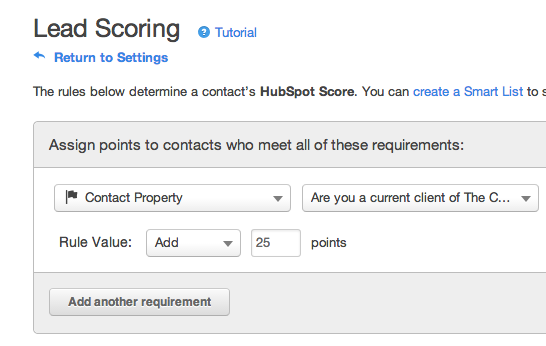5 Ways to Streamline Your Sales Funnel with Lead Nurturing
A career in sales often ranks amongst one of the most frustrating jobs in the world. There are times when you spend hours following what you believe...


If we were to break down the standard goal of an inbound marketing program, it would be to attract a high volume of visitors to your site and to convert as many of those qualified visitors into leads, and eventually customers.
The nice part about inbound marketing is that you might eventually have so many leads coming in that it becomes nearly impossible for every lead to be closely examined and contacted. This, of course, is a great problem to have… but how do we make sure we aren’t letting the good leads slip through the cracks, with some of the other less qualified leads, and that we are only sending sales the best leads we have as to not waste their time?
The benefit of using top of the line marketing software like HubSpot (enterprise and professional service levels) is that there are Lead Scoring tools you can use to actually automate the scoring of your leads, saving you time and helping you identify hot leads.
The Fundamentals of Automated Lead Scoring: Customizing the Criteria
The process of lead scoring involves assigning a grade, or score, to each of your leads. This score is based on the information you gather through forms, as well as the behaviors they exhibit on your website. The goal is to determine what makes a lead exceptionally qualified.
In order to determine what makes for a marketing or sales qualified lead, you’ll want to ask yourself:You’ll then plug these different actions, behaviors, or criteria into the Lead Scoring tool. You can use any points system you’d like, but typically you’ll want to stick to a 0 to 100 scale. The different criteria should be weighted in relation to the importance of that criteria or how telling it is about a lead’s readiness to be contacted or to buy.How to Know if You Need Lead ScoringAs with most automated options, it’s important that you determine first if it’s right for your business. While automating is great, sometimes that human touch is much more effective for anyone just launching an inbound program… it’s important that you are highly involved with evaluating leads until you have a good grasp on the type of leads you’re attracting and what makes them qualified, or not.
A good criterion to start with is based on quantity. Is your sales team having a hard time keeping up with the number of leads you’re sending their way? Or does your sales team regularly complain about the quality of your leads? Are they not being followed up with effectively because of this? Then it might be time for lead scoring.
If your lead flow is still rather low, and quantity and quality aren’t huge issues at this point, then lead scoring could actually be a waste of your time and prove ineffective.
Think about what’s best for your organization at this moment and time, and don’t opt for automating if it’s not going to actually increase your results and performance. However, if lead scoring does feel like a good fit – then take it slow, start with a few different criteria and grow from there. And most importantly, make sure there is a very clear alignment on how you’ll score so that both marketing and sales are always on the same page.

A career in sales often ranks amongst one of the most frustrating jobs in the world. There are times when you spend hours following what you believe...

Marketing organizations used to be able to get away with just creating well-designed content and slick campaigns. That’s no longer the case. Today,...
%20Thought%20Leadership%20Drives%20Lead%20Generation.png)
You’ve likely heard of thought leadership or been told that it’s a great way to be viewed as an expert in your chosen field. But have you ever...